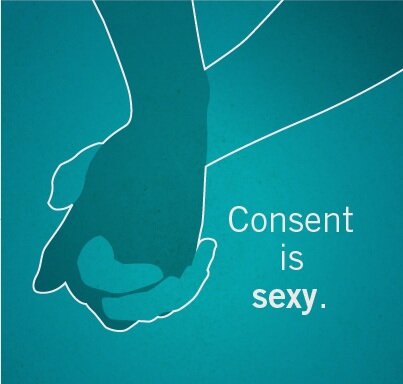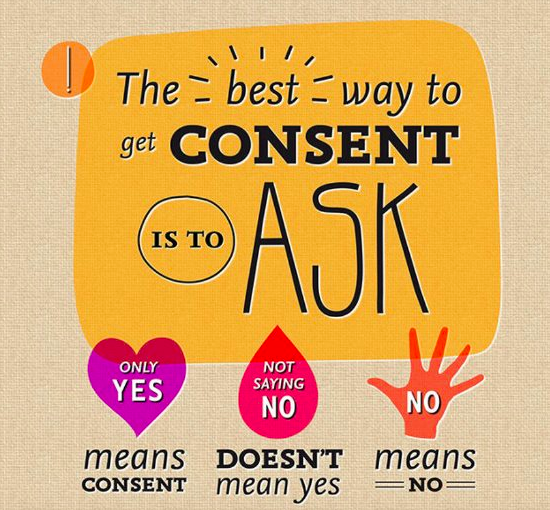Things to Think About
If you aren’t comfortable talking to your partner about sex, maybe they shouldn’t be your partner!
Don’t forget that if someone is drunk, high or asleep they can’t give consent!
Well, How Does Having a Conversation Work?
Some people are worried that talking about or getting consent will be awkward or that it will “ruin the mood,” which is far from true. If anything, the mood is much more positive when both partners feel safe and can freely communicate about what they want. First off, talk about what terms like “hooking up” or “going all the way” mean to each partner. Consider having these conversations during a time when you’re not being physically intimate.
If you are in the heat if the moment, here are some suggestions of things to say:
Are you comfortable?
Is this okay?
Do you want to slow down?
Do you want to go any further?
What consent looks like:
Communicating every step of the way. For example, during a hookup, ask if it’s okay to take your partner’s shirt off. Don’t just assume that they are comfortable with it.
Respecting that when they don’t say “no,” it doesn’t mean “yes.” Consent is a clear and enthusiastic yes! If someone seems unsure, stays silent, doesn’t respond, or says “Maybe…” then they aren’t saying “yes.”
Breaking away from gender “rules.” Girls are not the only ones who might want to take it slow. Also, it’s not a guy’s job to initiate the action (or anything else, really).
https://www.loveisrespect.org/healthy-relationships/what-consent/

Consent is ongoing. Both partners should keep giving, and looking for, consent. Just because you’ve given consent to an act before, doesn’t mean it becomes a “given” every time. This idea also relates to new relationships — just because you’ve given consent to something in a different relationship doesn’t make it “automatic” in a new relationship.
Consent is not a free pass. Saying yes to one act doesn’t mean you have to consent to other acts. Each requires its own consent. EX: Saying yes to oral sex doesn’t automatically mean you’re saying yes to intercourse.
Your relationship status does not make consent automatic. If you’re married to someone, friends with someone, or dating someone, it doesn’t mean they ‘own’ your consent by default. Or that you own theirs. Also, consent can be taken back at any time — even if you’re in the midst of something and feeling uncomfortable, you always have the right to stop.
There’s no such thing as implied consent. The absence of a “no” does not equal a “yes.” What you or a partner chooses to wear doesn’t mean that you or they are inviting unwanted sexual attention or “pre-consenting.” The same can be said for flirting, talking, showing interest or any other actions.
It’s not consent if you’re afraid to say no. It’s not consent if you’re being manipulated, pressured, or threatened to say yes. It’s also not consent if you or a partner is unable to legitimately give consent, which includes being asleep, unconscious, under the influence of conscious-altering substances or not able to understand what you’re saying yes to.
Nonconsent means STOP. If anyone involved isn’t consenting, then what is happening is or could be rape, sexual assault or abuse.
https://www.thehotline.org/2013/04/16/what-is-healthy-consent-what-isnt-consent/

